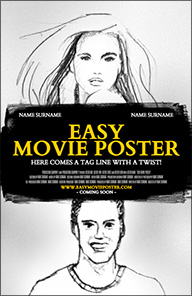Reimagining Cinema: The Future of Movie Posters Through AI Magic
Reimagining Cinema: The Future of Movie Posters Through AI Magic
Blog Article

In recent years, artificial intelligence has revolutionized various industries, and the world of cinema is no exception. One of the most exciting developments is the emergence of AI movie poster generators, tools that harness the power of machine learning to create stunning visual representations of films. These innovative platforms are not just transforming the design process; they are opening the door to a new era of creativity and expression in how movies are marketed and perceived.
As filmmakers and studios strive to capture audiences' attention in a crowded marketplace, the role of movie posters has never been more crucial. AI movie poster generators offer a fresh approach, allowing for quick iterations and unique designs that reflect the essence of a film. This technology promises to enhance the artistic possibilities, enabling designers to explore imaginative concepts that might have been impossible within traditional constraints. As we look toward the future, it is fascinating to consider how AI will continue to shape the visual landscape of cinema and how it will influence the way we experience storytelling on the big screen.
The Evolution of Movie Posters
Throughout the history of cinema, movie posters have served as captivating visual gateways to the films they represent. In the early days of the 20th century, posters were often hand-painted, showcasing imaginative artwork that reflected the film's content. The designs were bold and vibrant, often featuring the lead actors in dramatic poses that drew the audience's attention. These artworks were a vital marketing tool, capturing the essence of the film and enticing potential viewers to buy tickets.
As the film industry evolved, so too did the design of movie posters. The mid-20th century saw a shift towards more graphic design elements and typographic experimentation. With the rise of genres like film noir and musicals, posters began to adopt a more stylized approach, often incorporating photographs and unique layouts. This era introduced iconic designs that not only represented the films but also became cultural symbols, influencing art and design trends beyond the cinema.
Today, the advent of digital technology has transformed the landscape of movie poster creation. Traditional methods are complemented by powerful design software that allows for unprecedented creativity and innovation. As filmmakers and marketers embrace new techniques, the introduction of AI movie poster generators is reshaping the process entirely. These tools can analyze trends, understand audience preferences, and produce visually stunning posters in a fraction of the time, paving the way for a new era in film marketing.
AI Technology in Visual Design
Artificial intelligence is rapidly transforming the landscape of visual design, particularly in the realm of movie posters. Traditional design processes often involve multiple iterations and extensive creativity from artists. However, AI movie poster generators streamline this process by analyzing existing designs and styles, allowing for the creation of unique and compelling visuals in a fraction of the time. By leveraging machine learning algorithms, these tools can generate diverse poster concepts that reflect current trends and audience preferences.
One of the significant advantages of using AI in visual design is its ability to learn from vast datasets. By examining countless movie posters, AI generates options that combine colors, typography, and imagery in ways that resonate with viewers. This technology can even suggest modifications based on audience analysis, making it easier for studios to target specific demographics effectively. Designers can utilize these insights to enhance their creative process while maintaining artistic integrity.
Moreover, AI movie poster generators open up new opportunities for collaboration between technology and human creativity. Designers can use AI-generated suggestions as a starting point, refining and personalizing these concepts to create something truly original. This synergy not only fosters innovation in visual design but also democratizes creativity, allowing even those with limited artistic skills to produce professional-quality posters. As AI continues to evolve, the potential for fresh and engaging movie poster designs is virtually limitless.
Future Trends in Movie Poster Creation
As the technology behind AI movie poster generators continues to evolve, we can expect greater involvement of personalization in the design process. Filmmakers and marketing teams will increasingly turn to these tools to create posters that resonate with specific target audiences. By analyzing viewer preferences and trends, AI can produce tailored designs that reflect the interests of various demographic segments. This customization could lead to a more engaged audience, enhancing the effectiveness of promotional campaigns and ultimately driving ticket sales.
Another significant trend is the integration of interactive elements into movie posters. With advancements in augmented reality and digital platforms, traditional static posters may soon give way to dynamic, interactive experiences. AI movie poster generators could enable creators to include QR codes or augmented reality features that allow viewers to explore a deeper narrative. By merging visual art with technology, movie posters can transform from simple promotional tools into immersive experiences that captivate and entice potential audiences.
Free Movie Poster Design
Finally, sustainability will become a key focus in the production of movie posters. As awareness of environmental issues increases, filmmakers are likely to seek eco-friendly practices in all aspects of production, including marketing materials. AI movie poster generators can facilitate this shift by optimizing designs for digital distribution, reducing the need for printed materials. This change not only aligns with global sustainability goals but also caters to a growing audience that values eco-conscious messaging in the entertainment industry.
Report this page